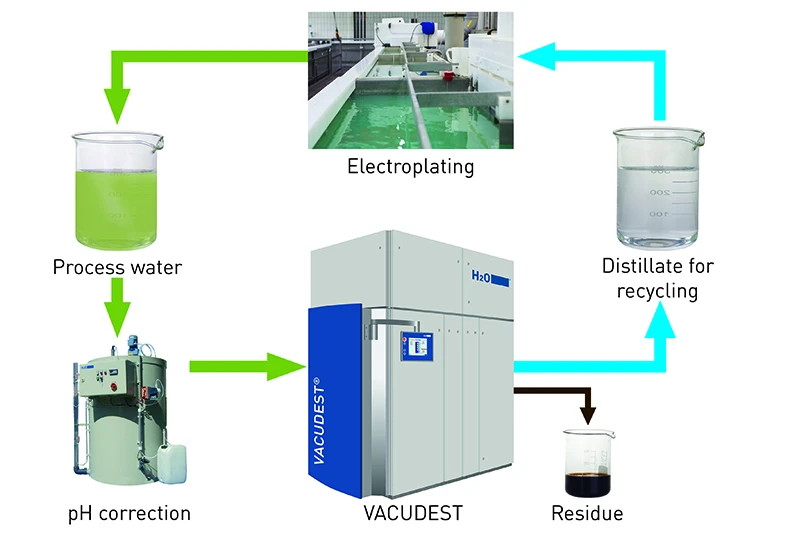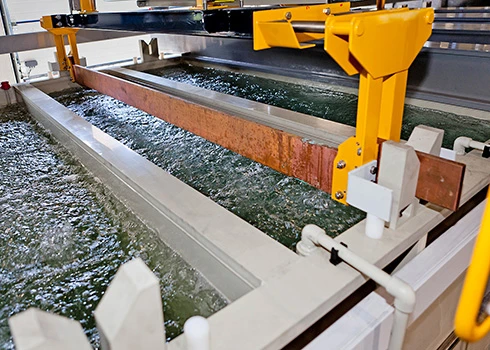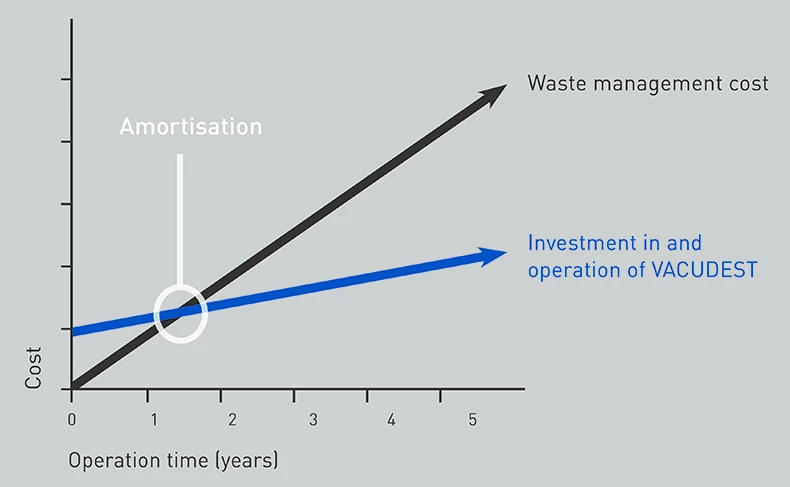Contacto

€10/m³ treatment costs for your electroplating rinsing water – a comparison with disposal costs reveals huge potential for savings.
Traditionally, electroplating processes are used to apply functional or decorative metal coatings to steel or iron surfaces. More recent developments are now also leading to an increasing demand for plastic electroplating, which uses plastic as the substrate for the metal coating. All electroplating plants generate many different types of industrial wastewater during their various process steps. And all electroplating applications have one thing in common: The wastewater is expensive to dispose of, with costs rising up to €800/m³. H2O GmbH‘s vacuum distillation system presents an efficient, cost-saving solution tothis problem. Even for an annual wastewater volume of just 1,000 m³, the VACUDEST vacuum evaporator can save its owners up to €750,000 per year. As such, it has an amortisation period of less than one year.
In the electroplating technology sector, industrial wastewater comes in many different forms. These are distinguishable by their content of salts, heavy metals and sometimes strong acids. These types of industrial wastewater can be made up of rinsing water from any number of different processes, such as degreasing, galvanisation, nickel plating, acid cleaning, copper plating or chrome plating.
The VACUDEST offers a reliable method of treating these mixtures of rinsing water, and in most cases we recommend simply inserting a neutralisation unit upstream of the VACUDEST to adjust the pH value of the mixture.
High savings potential for disposal costs
Disposal companies charge a lot of money for the disposal of wastewater from the electroplating industry because of its high heavy metal content. The typical costs are somewhere between €200 and €800/m³, though the exact sum is dependent on the type and level of contamination. Rinsing water from degreasing processes comes in at the lower end of the cost scale for disposal, whereas wastewater with cyanide content can be found at the top end. The potential savings for this process are significant: between €190 and €750/m³.
The example in Figure 3 shows annual disposal costs of €400/m³ for 1,000 m³ of wastewater in comparison with the investment and operating costs for the VACUDEST. The calculated amortisation period for the VACUDEST vacuum evaporation system is just one year.
Compact design saves space
The cutting-edge VACUDEST technology represents an efficient alternative to the traditional, chemical-physical treatment process, which uses a high volume of chemicals and entails a heavy workload. With this new method, there is no need for cost-intensive post-treatment of the distillate using residual oil filters, activated carbon or ion exchangers. In many of our past projects, we have been able to implement a recycling process. This conserves valuable fresh water resources and protects the environment.
Optimised cleaning process increases energy efficiency
The modular addition of our patented Activepowerclean grinding balls minimises the use of cleaning chemicals. During distillation, the salt content in industrial wastewater tends to form deposits on the inner surfaces of the heat exchanger. This is why we developed Activepowerclean. The grinding balls circulate constantly in the heat exchanger throughout the distillation process, thus keeping the insides of the pipes almost completely free of deposits. This allows for maximum production efficiency without any need for chemicals.
If recycling is not a priority for your project, the distillate can be discharged, as it usually complies with the qualitative thresholds set by the local authorities.
Only 2–5 operating hours per week thanks to automatic running
The fully automatic operation of the VACUDEST vacuum distillation system makes it a worthwhile investment. The system can be run with almost zero manual supervision, thus freeing up resources that would otherwise be required to operate a traditional water treatment system. Only 2–5 labour hours per week are required to run the VACUDEST, depending on the size of the system. Traditional water treatment systems, on the other hand, require constant supervision by operating staff during their
operation – a costly task. When compared with the approx. €80/m³ required for the operation work and chemicals associated with this type of system, the operating costs for the VACUDEST represent a potential saving of approx. €70/m³. And the potential savings are even higher when compared with disposal costs.
The VACUDEST vacuum distillation system is a low-operating-cost, low-disposal-cost solution for the treatment of rinsing water from a wide range of electroplating processes
Author:
Marius Straub
Graduated Project Engineer
H2O GmbH

You can save more than €400/m³ by using a VACUDEST to treat the rinsing water from your electroplating
process.

Thanks to its low operating costs, the VACUDEST has an amortisation period of just one year.
¿Está bien informado pero aún tiene preguntas?
Nuestros expertos tienen la respuesta.
¿Quiere ser parte de nuestro equipo y ayudarnos a lograr un futuro libre de aguas residuales?
¡Nosotros le decimos como hacerlo!
Su contacto:
Bettina Böhringer
Personalreferentin
+49 7627 9239-201
career@h2o-de.com
¿Necesita consumibles, piezas de recambio o una cita para mantenimiento?
¡Con gusto le ayudamos!
Su contacto:
Carles Fité
Responsable de asistencia técnica al cliente
+49 7627 9239-888
carles.fite@h2o-de.com
¿Tiene preguntas acerca de nuestro sistema VACUDEST?
¡Contáctenos!
Su contacto:
Thomas Dotterweich
Senior Sales Engineer
+49 7627 9239-306
thomasm.dotterweich@h2o-de.com